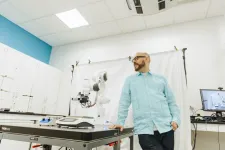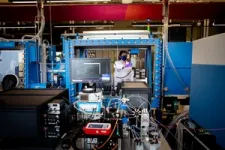(Press-News.org) The University of Toronto has been awarded a $200-million grant from the Canada First Research Excellence Fund (CFREF) to revolutionize the speed and impact of scientific discovery through its Acceleration Consortium. The funding – the largest federal research grant ever awarded to a Canadian university – will support the consortium’s work on “self-driving labs” that combine artificial intelligence, robotics and advanced computing to discover new materials and molecules in a fraction of the usual time and cost. Applications include everything from life-saving medications and biodegradable plastics to low-carbon cement and renewable energy.
Researchers in the consortium recently revealed that they used the technology to develop a potential cancer drug in just 30 days – a process that typically takes years, or even decades.
“The University of Toronto is grateful for this significant investment in artificial intelligence-driven research and innovation, which promises to improve the lives of Canadians and those of people around the world,” said U of T President Meric Gertler.
“The federal government’s critical support of this initiative builds on years of strategic planning and decisions in this space by the University and the federal government, including the 2017 launch of the Pan-Canadian Artificial Intelligence Strategy that helped cement Toronto’s status as a global hub for a revolutionary technology.
“This is the next step in achieving that bold vision.”
François-Philippe Champagne, minister of innovation, science and industry, announced the U of T funding alongside 10 other large-scale projects across the country.
“The initiatives announced today will lead to breakthrough discoveries that will improve people’s lives, nourish our innovation ecosystems, and shape Canada’s prosperity for years to come,” he said in a statement. “Such is the value of Canadian institutions and researchers who think outside the box to tackle the greatest challenges of our time.”
Launched as an Institutional Strategic Initiative in 2021, the Acceleration Consortium brings together partners from academia, government and industry who are accelerating the discovery of materials and molecules needed for a sustainable future. The consortium aims to reduce the time and cost of bringing advanced materials to market, from an average of 20 years and $100 million to as little as one year and $1 million.
“Our goal is to accelerate science,” said Acceleration Consortium Director Alán Aspuru-Guzik, a professor in the departments of chemistry and computer science in the Faculty of Arts & Science who is a CIFAR AI Chair at the Vector Institute for Artificial Intelligence. “To do that, we realized we need to take a cue from self-driving cars and extended that concept to a self-driving lab, which uses AI and automation to carry out more experiments in a smarter way.
“We’ve essentially supercharged the process of scientific discovery.”
The CFREF funding, along with additional support from U of T – which includes an investment of $130 million to expand facilities to house the Acceleration Consortium’s state-of-the-art labs at the Lash Miller Chemical Laboratories building on the St. George campus – will help secure the researchers, spaces and partnerships needed to build a world-leading centre for accelerated materials discovery and innovation.
The funding will also help the consortium rapidly create high quality datasets to better train AI models and validate the model’s predictions in real time. That, in turn, will dramatically accelerate the discovery and development of molecules and materials for a wide range of industries.
With a strong plan of equity, diversity and inclusion guiding project implementation and research design, the initiative will commercialize ethically designed technologies and materials to benefit society and train today’s scientists with the skills they need to advance the emerging field of accelerated materials discovery. It will also allow the consortium to examine critical issues regarding the application of the technology, including from environmental and Indigenous perspectives.
“With this funding – which enabled us to obtain matching commitments of about $300 million from all our partners – we are talking about half a billion dollars of investments, said Aspuru-Guzik, who joined U of T from Harvard University in 2018 as a Canada 150 Research Chair in Theoretical and Quantum Chemistry and is one of a growing number of global experts at the Acceleration Consortium.
“This will help us make the Greater Toronto Area and Canada world leaders in AI-frontier discovery – we have no excuse not to be after this project.”
The Acceleration Consortium comprises nearly 100 researchers – and is hiring many more – across a wide variety of disciplines, including AI, computer science, mathematics, chemistry, economics, engineering, materials science, mechatronics, biology, pharmacology, robotics, technoscience and more. It also includes 30 partners from the private and public sector, including the University of British Columbia, a lead partner on the grant.
“What’s unique about this model is that it’s kind of this idea of a university without borders,” said Jason Hein, Acceleration Consortium’s associate director of academic partnerships and an associate professor in the chemistry department in the Faculty of Science at UBC.
“What happens a lot in Canadian research culture is that we’re good at punching above our weight class, but, in the past, other countries have had bigger budgets. What’s great about this is that through the energy of the people at Acceleration Consortium, we’re saying, ‘We’re doing something huge here.’ And to get the vote of confidence back saying, ‘Yes, we believe in you and let’s go forward’ is really important.”
CFREF aims to boost the strengths of Canadian postsecondary institutions so that they can achieve global success in research areas that create long-term social and economic advantages for Canada. It invests approximately $200 million per year (or approximately $1.4 billion over a competition cycle of seven years) through a highly competitive peer review process.
“We named this a consortium and not an institute for a reason,” Aspuru-Guzik said. “We are a global effort with its homebase in Toronto that involves academia, government and industry.
“A core goal of our efforts is to spin out the next generation of companies that will develop the materials for the 21st century here in Canada. This, in turn, will help make the GTA the economic epicentre for this field.”
Leah Cowen, U of T’s vice-president, research and innovation, and strategic initiatives, said the impact of the CFREF grant will be felt far beyond Acceleration Consortium itself.
“This level of investment can really transform how universities do innovation,” she said. “It allows us to not only drive forward discovery, but also improve adoption by Canadian companies and foster an ethical approach to technology development that’s guided by principles of equity, diversity and inclusion, benefiting all segments of society.”
END
U of T receives $200-million grant to support Acceleration Consortium's ‘self-driving labs’ research
The University of Toronto has been awarded a $200-million grant from the Canada First Research Excellence Fund (CFREF) to revolutionize the speed and impact of scientific discovery through its Acceleration Consortium.
2023-04-28
ELSE PRESS RELEASES FROM THIS DATE:
Scientists identify antivirals that could combat emerging infectious diseases
2023-04-28
A new study has identified potential broad-spectrum antiviral agents that can target multiple families of RNA viruses that continue to pose a significant threat for future pandemics. The study, led by Gustavo Garcia Jr. in the UCLA Department of Molecular and Medical Pharmacology, tested a library of innate immune agonists that work by targeting pathogen recognition receptors, and found several agents that showed promise, including one that exhibited potent antiviral activity against members of RNA viral families.
The ongoing SARS-CoV-2 pandemic, which ...
Study finds ChatGTP outperforms physicians in providing high-quality, empathetic advice to patient questions
2023-04-28
La Jolla, Calif. (April 28, 2023) — There has been widespread speculation about how advances in artificial intelligence (AI) assistants like ChatGPT could be used in medicine.
A new study published in JAMA Internal Medicine led by Dr. John W. Ayers from the Qualcomm Institute within the University of California San Diego provides an early glimpse into the role that AI assistants could play in medicine. The study compared written responses from physicians and those from ChatGPT to real-world health questions. A panel of licensed healthcare professionals preferred ChatGPT’s responses 79% of the time and rated ChatGPT’s responses as higher quality ...
Structured exploration allows biological brains to learn faster than AI
2023-04-28
Neuroscientists have uncovered how exploratory actions enable animals to learn their spatial environment more efficiently. Their findings could help build better AI agents that can learn faster and require less experience.
Researchers at the Sainsbury Wellcome Centre and Gatsby Computational Neuroscience Unit at UCL found the instinctual exploratory runs that animals carry out are not random. These purposeful actions allow mice to learn a map of the world efficiently. The study, published today in Neuron, describes how ...
Health care utilization during the pandemic among individuals born preterm
2023-04-28
About The Study: The findings of this study suggest that during the COVID-19 pandemic, children and young adults born preterm were more likely to have used health care related to COVID-19 concerns compared with their term-born peers, independent of a history of bronchopulmonary dysplasia or asthma. Further exploration of factors associated with COVID-19–related health care use may facilitate refinement of care models.
Authors: Elisabeth C. McGowan, M.D., of Brown University in Providence, Rhode Island, is the corresponding author.
To access the embargoed study: Visit our For The Media website at this link ...
Comparing physician and AI chatbot responses to patient questions
2023-04-28
About The Study: In this study of 195 randomly drawn patient questions from a social media forum, a team of licensed health care professionals compared physician’s and chatbot’s responses. The chatbot responses were preferred over physician responses and rated significantly higher for both quality and empathy. Further exploration of this technology is warranted in clinical settings, such as using chatbot to draft responses that physicians could then edit. Randomized trials could assess further if using AI assistants might ...
Treatment of children with ADHD
2023-04-28
About The Study: The results of this study of children with parent-reported attention-deficit/hyperactivity disorder (ADHD) suggest that most were not receiving ADHD medications and had never received outpatient mental health care. Gaps in treatment, which were not directly associated with socioeconomic disadvantage, underscore the challenges of improving communication and access to outpatient mental health care for children with ADHD.
Authors: Mark Olfson, M.D., M.P.H., of Columbia University and the New York State Psychiatric ...
Bentley University study shows NIH investment in new drug approvals is comparable to investment by pharmaceutical industry
2023-04-28
BENTLEY UNIVERSITY
The National Institutes of Health (NIH) spent $187 billion for basic or applied research related to 354 of the 356 drugs approved by the FDA from 2010-2019, according to a new study from Bentley University’s Center for Integration of Science and Industry. The study, published in JAMA Health Forum, shows that the amount invested per approved drug by the NIH is comparable to that of reported investment by the biopharmaceutical industry. The article, titled “Comparison of research spending on new drug approvals by the U.S. National Institutes of Health versus industry, 2010-2019,” is the first to compare the total value of NIH and ...
Six-fold increase in rural cancer screenings with remote outreach
2023-04-28
COLUMBUS – Rural women are six times more likely to get timely breast, cervical and colorectal cancer screening with remote outreach that involves interactive education and follow-up support by telephone, according to a new study.
Through the Rural Interventions for Screening Effectiveness (RISE) study, researchers with The Ohio State University Comprehensive Cancer Center – Arthur G. James Cancer Hospital and Richard J. Solove Research Institute along with researchers with the Indiana University Melvin and Bren Simon Comprehensive Cancer Center compared the effectiveness ...
Artificial photosynthesis for environmentally friendly food production
2023-04-28
Artificial photosynthesis for environmentally friendly food production
TUM researchers produce important amino acid from greenhouse gas CO2
Growing demand for food in the world
Biotechnological process via methanol as intermediate product
Less ground required than for plant cultivation
Ensuring the supply of food to the constantly growing world population and protecting the environment at the same time are often conflicting objectives. Now researchers at the Technical University of Munich (TUM) have successfully developed ...
British Ecological Society announces journal prize winners
2023-04-28
Today the British Ecological Society (BES) has announced the winners of its journal prizes for research published in 2022. The prizes are awarded for the best paper by an early career researcher in seven of the BES journals: Journal of Applied Ecology, Ecological Solutions and Evidence, Functional Ecology, People and Nature, Methods in Ecology and Evolution, Journal of Ecology and Journal of Animal Ecology.
The winning papers are selected by the Senior Editors of the journals and the awards will be presented to the winners at the BES Annual Meeting in Belfast at the end of the year.
The winners receive a prize of £250, membership of the BES, a year’s subscription to ...
LAST 30 PRESS RELEASES:
Reconstructing the world’s ant diversity in 3D
UMD entomologist helps bring the world’s ant diversity to life in 3D imagery
ESA’s Mars orbiters watch solar superstorm hit the Red Planet
The secret lives of catalysts: How microscopic networks power reactions
Molecular ‘catapult’ fires electrons at the limits of physics
Researcher finds evidence supporting sucrose can help manage painful procedures in infants
New study identifies key factors supporting indigenous well-being
Bureaucracy Index 2026: Business sector hit hardest
ECMWF’s portable global forecasting model OpenIFS now available for all
Yale study challenges notion that aging means decline, finds many older adults improve over time
Korean researchers enable early detection of brain disorders with a single drop of saliva!
Swipe right, but safer
Duke-NUS scientists identify more effective way to detect poultry viruses in live markets
Low-intensity treadmill exercise preconditioning mitigates post-stroke injury in mouse models
How moss helped solve a grave-robbing mystery
How much sleep do teens get? Six-seven hours.
Patients regain weight rapidly after stopping weight loss drugs – but still keep off a quarter of weight lost
GLP-1 diabetes drugs linked to reduced risk of addiction and substance-related death
Councils face industry legal threats for campaigns warning against wood burning stoves
GLP-1 medications get at the heart of addiction: study
Global trauma study highlights shared learning as interest in whole blood resurges
Almost a third of Gen Z men agree a wife should obey her husband
Trapping light on thermal photodetectors shatters speed records
New review highlights the future of tubular solid oxide fuel cells for clean energy systems
Pig farm ammonia pollution may indirectly accelerate climate warming, new study finds
Modified biochar helps compost retain nitrogen and build richer soil organic matter
First gene regulation clinical trials for epilepsy show promising results
Life-changing drug identified for children with rare epilepsy
Husker researchers collaborate to explore fear of spiders
Mayo Clinic researchers discover hidden brain map that may improve epilepsy care
[Press-News.org] U of T receives $200-million grant to support Acceleration Consortium's ‘self-driving labs’ researchThe University of Toronto has been awarded a $200-million grant from the Canada First Research Excellence Fund (CFREF) to revolutionize the speed and impact of scientific discovery through its Acceleration Consortium.



